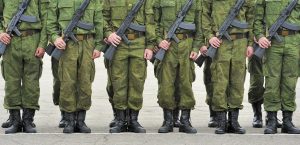It’ll be a busy week in Moscow. On May 7, President Vladimir Putin will be inaugurated into an unprecedented fifth term following the March election. On May 8, the Eurasian Economic Union’s Supreme Eurasian Economic Council, comprised of members heads of state, is scheduled to meet in Moscow. It’s the organization’s 10th anniversary. On May 9, Russia marks Victory Day. And once again all five Central Asian presidents are scheduled to attend.
The May 9 holiday marks the surrender of Nazi Germany and the end of World War II, known as the Great Patriotic War across the former Soviet Union. The Soviet Union lost as many as 27 million people during World War II, an immense sacrifice of lives from Russia, but also Ukraine, Belarus, and the other constituent Soviet republics. As nationalism deepens in Russia, and Moscow’s revanchism is still on the march in Ukraine, the May 9 holiday has taken on increasing significant in the country – even as its importance fades elsewhere in the former Soviet Union.
Take Kazakhstan as an example. Kazakhstan has not held a Victory Day parade since 2019. The 2020 and 2021 parades were canceled, with authorities citing the COVID-19 pandemic. In 2022, the Ministry of Defense announced that there would be no parade. A member of parliament commented at the time: “Before this there were epidemic reasons, now there are economic reasons.” In 2023, defense officials cited the need to “save budget funds” and “solve other problems.” And in 2024, the ministry used the exact same language.
The holiday remains on calendars across the region, and local celebrations are sure to mark the day in many Central Asian cities, but its importance has decidedly faded. In 2022, the Uzbek Ministry of Defense announced that there would be no military parade to mark the day and a ministry spokesperson said, “In Uzbekistan, May 9 is a Day of Remembrance and Honor and not a Victory Day.”
A requiem service will be held in Bishkek, but there will be no Victory Day parade this year – and the “Immortal Regiment” march has also been canceled. The “Immortal Regiment” is ostensibly a civilian-motivated rally to commemorate and memorialize those who fought in and supported the war effort in the 1940s, built on marches of veterans from that era. In the 2010s the marches began occurring in Central Asian capitals too. But in recent years, they have not been held. Kazakhstan stopped holding the marches in 2022.
Tajikistan isn’t holding a military parade to mark May 9 this year either, and it’s unclear if its “Immortal Regiment” procession will go ahead or not.
The most prominent celebrations of May 9 have always been held in Moscow, with the guest list taking on distinct geopolitical features in recent years. On the 65th anniversary in 2010, Putin hosted leaders from Europe — including most notably then-German Chancellor Angela Merkel. But after the Russian annexation of Crimea in 2014, rather than marking a moment of great global cooperation in the fight against fascism, the Victory Day holiday has been transformed into a nationalistic display. The 2022 and 2023 celebrations took place under the watchful eye of the world, with the conflict in Ukraine framing the celebrations.
Four of the five Central Asian presidents attended the delayed-to-June Victory Day parade in 2020; only Tajikistan’s Emomali Rahmon attended in 2021 and none attended in 2022.
But in 2023, all five Central Asia presidents attended, and that trend is set to continue.
Kyrgyz President Sadyr Japarov and Kazakh President Kassym-Jomart Tokayev have both announced plans to travel to Moscow on May 8-9 to attend the EAEU meeting and the Victory Day parade.
Tajik President Emomali Rahmon spoke with Putin via phone on May 3 about “Issues of joint participation in ceremonial events dedicated to Victory Day in Moscow,” to which Rahmon has been invited, per a Kremlin readout. The readout went on to note, “Confidence was also expressed that the recent intensified attempts by certain forces to artificially escalate the situation around labor migrants coming to Russia, including from Tajikistan, will be jointly suppressed and will not be able to damage the time-tested fraternal relations between the peoples of the two countries.” A line from Hamlet – “The lady doth protest too much, methinks” – comes to mind, given that just over a week ago Tajik authorities cautioned citizens against travel to Russia.
Nevertheless, a May 6 press release from the Russian Foreign Ministry included Rahmon on the list of “guests of honor.” The press release also noted that Uzbek President Shavkat Mirziyoyev and Turkmen President Serdar Berdimuhamedov would be attending. (From outside Central Asia: Belarusian President Alexander Lukashenko, Cuban President Miguel Diaz-Canel Bermudez, Laos President Thongloun Sisoulith, and Bissau-Guinean President Oumarou Sissokou Embalo are attending)
If, as seems to be likely, all five Central Asian presidents again attend the Victory Day celebrations in Moscow, what can we infer about the state of the relationships between these countries and Russia? At the very least, Central Asia’s leaders don’t see the need to snub Russia in this instance – or much value in doing so. Attending to Putin’s thirst for pomp and circumstance by standing beside him on Victory Day is a small price to pay for countries that are dealing with all sides – and Central Asian leaders can be certain that attending will not disrupt Western efforts to court them. With so few foreign leaders willing or welcome in Moscow, Central Asia’s presidents are stepping into a glaring spotlight.

































